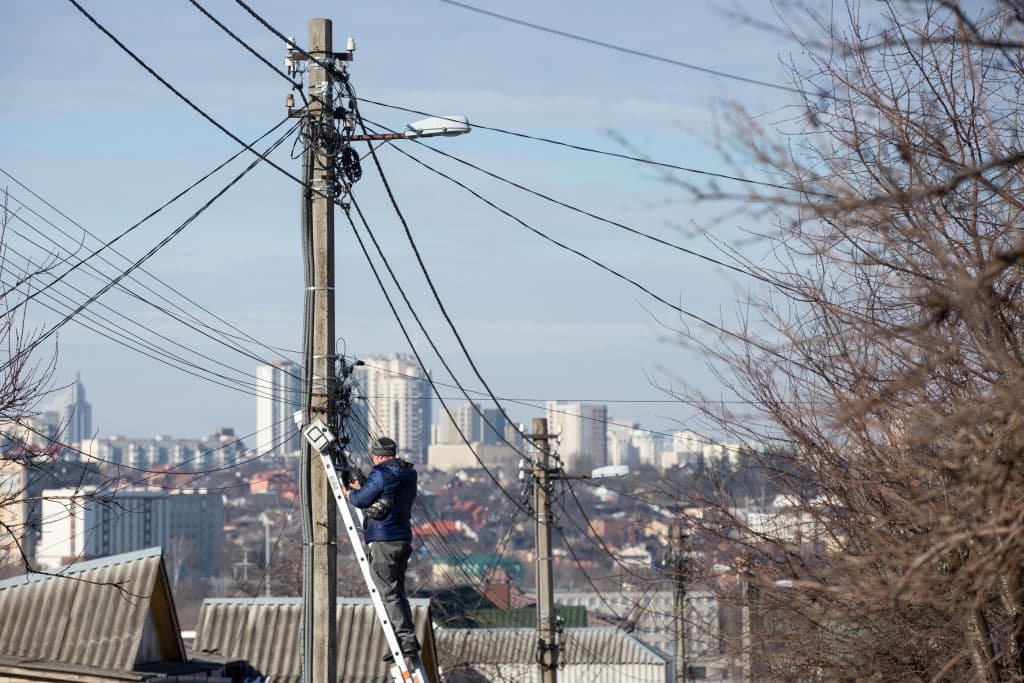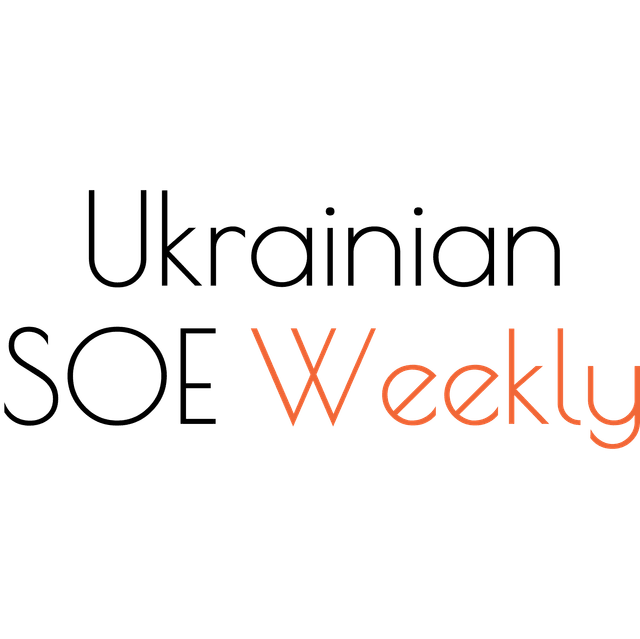Editor’s Note: This is issue 74 of Ukrainian State-Owned Enterprises Weekly, covering events from Feb. 4-10, 2023. The Kyiv Independent is reposting it with permission.
Ukrainian SOE Weekly is an independent weekly digest based on a compilation of the most important news related to state-owned enterprises (SOEs) and state-owned banks in Ukraine. This publication was produced with the financial support of the European Union within the project “Supporting Ukraine in rebuilding and recovery” implemented by the KSE Institute. The contents of this publication are the sole responsibility of the editorial team of the Ukrainian SOE Weekly and do not necessarily reflect the views of the European Union.
Corporate governance of SOEs
Energoatom’s corporatization approved by the Verkhovna Rada. On Feb. 6, the Verkhovna Rada passed the draft law on the corporatization of the state nuclear power company Energoatom.
The bill was proposed by lawmakers Ostap Shypailo, Andriy Gerus (both from the ruling Servant of the People faction), and other members of parliament. It establishes the legal, economic, and organizational foundations to transform Energoatom from a state enterprise to a joint-stock company (JSC) to improve its efficiency and corporate governance.
According to the Energy Committee of the Verkhovna Rada, establishing good corporate governance of SOEs is one of Ukraine’s obligations under the Association Agreement with the EU.
Energoatom remains 100% state-owned, with the Cabinet of Ministers as its ownership entity, the committee explained.
At the same time, the shares acquired by the state as a result of converting the company into a JSC are not subject to privatization, and it is also prohibited to divide the state-owned package of shares.
In SOE Weekly (Issue 69), we reported that the Verkhovna Rada approved in the first reading the draft law on the corporatization of Energoatom.
In SOE Weekly’s overview of the top 2021 events (Issue 58), we forecasted that Energoatom had every chance to be corporatized in 2022.
Decisions to corporatize Energoatom have been made since 2012, starting with the National Action Plan for 2012 on the Implementation of the Programme of Economic Reforms in Ukraine for 2010-2014.
In Issue 41, we wrote that President Volodymyr Zelensky signed a Presidential Decree on Aug. 28, 2021, instructing the Cabinet of Ministers to develop and submit a draft law on the transformation of Energoatom by Sept. 30, 2021.
In Issue 53, we wrote that the 2021 IMF Memorandum included a commitment from the Ukrainian authorities to ensure that the law on the corporatization of Energoatom is enacted by the end of December 2021. Energoatom would then have to get a supervisory board with a majority of independent members. It would also be required to produce financial accounts per international standards by May 2022 (a new structural benchmark at that time).
Energy sector
Ukrenergo faces another Russian missile and drone attack on its energy facilities. Ukrenergo reported that Russia launched another missile and drone attack on Ukraine’s energy infrastructure. This was Russia’s 14th attack in its series of mass missile attacks and 16th in the series of drone attacks (since Oct. 10), Ukrenergo added.
The attack started during the night of Feb. 10 and continued until late morning. According to Ukrenergo, several high-voltage infrastructure facilities in the eastern, western, and southern regions were hit, leading to power outages in some regions.
To minimize the possible consequences of the attack and preserve the power system, Ukrenergo is taking the necessary preventive measures and using emergency shutdowns.
After every Russian mass missile attack on Ukraine’s vital infrastructure, emergency outages take place, lasting for days due to the ongoing repair works. During such outages, people in Ukraine are often left without electricity, heating, water supply, or access to mobile phone networks. – SOE Weekly.
In SOE Weekly (Issue 72), we reported on the previous wave of Russia’s missile and drone attacks. According to Ukrenergo’s CEO Volodymyr Kudrytskyi, that time, just like before, Russia did not achieve its goal of causing a collapse in the Ukrainian power system.
In SOE Weekly (Issue 66), we reported about the constant Russian attacks on Ukraine’s vital infrastructure. On Dec. 16, Ukrenergo reported an emergency situation as Ukraine’s united energy system suffered a 50% consumption loss due to Russia’s missile attacks. Apparently, consumption dropped because of the attacks on the transmission system.
Defense
Ukroboronprom starts producing ammunition jointly with a NATO country. On Feb. 9, Ukroboronprom announced that it had begun producing 120 mm mines jointly with a NATO member state. Ukroboronprom did not name the NATO country.
According to the company, the 120 mm mine is the first product to be jointly produced by Ukraine and a NATO member state. Recently, Ukroboronprom signed a contract with Ukraine’s Defense Ministry for the supply of these munitions, so the Ukrainian military will receive them soon, the company said.
Ukroboronprom stressed that the 120 mm mortar is one of the most common types of artillery weapons in Ukraine, actively used by Ukraine’s Armed Forces.
Earlier, Ukroboronprom started serial production of 82-mm mortar rounds abroad, using in-house technology. However, the 120-mm mine is a joint product with Western allies, the company explained.
Besides, on Feb. 6, Ukroboronprom and the Czech company VOP CZ reached an agreement on the production, repair, and joint development of armored vehicles, as well as the creation of new supply chains for parts and products.
Privatization
State Property Fund puts another port up for privatization. The State Property Fund of Ukraine (SPFU) announced a privatization auction for the Bilhorod-Dnistrovskyi trade port. The auction is to be held on March 3 with a starting price of Hr 187.6 million ($5.1 million). This will be the second sale of a port since the independence of Ukraine.
The guarantee deposit fee has been set at Hr 37.5 million ($1 million), or 20% of the starting price. On July 28, the privatization law increased the guarantee deposit fees for privatization auctions from 10% to 20% of the starting price, apparently aiming to minimize the risk of the winning bidder refusing to purchase the asset, which was not an uncommon practice until recently.
After the full-scale Russian invasion, Bilhorod-Dnistrovskyi was blocked from the sea, but it has been used for transshipment.
According to the State Property Fund, Bilhorod-Dnistrovskyi’s losses ranged between Hr 23.5 million and Hr 28.5 million ($643,000-780,000) in 2019-2021. Its losses in January-September 2022 were Hr 2.9 million ($79,000).
As of Sept. 30, the port’s overdue accounts payables were Hr 104.7 million ($2.9 million). This suggests that the buyer will have to repay these debts, which adds up to the selling price of the port.
In SOE Weekly (Issue 71), we reported that on Jan. 17, the State Property Fund sold the Ust-Dunaisk trade port for Hr 201 million ($5.5 million), a more than threefold increase from the starting price of Hr 60 million ($1.6 million). This was the first sale of a port in the history of independent Ukraine.
Interest groups have tried to block the deal, challenging the sale via filing a statement with the National Anti-Corruption Bureau of Ukraine (NABU) and sending letters to Prime Minister Denys Shmyhal, speaker of the Verkhovna Rada Ruslan Stefanchuk, and head of the State Property Fund Rustem Umerov.
Confiscation of the aggressor state’s assets, nationalization, and asset seizure
Russian oligarch Usmanov’s iron ore worth almost Hr 2 billion transferred to ARMA. On Feb. 7, the Economic Security Bureau of Ukraine (ESB) handed over almost 170,000 tonnes of sanctioned Russian oligarch Alisher Usmanov’s iron ore with an estimated value of Hr 1.8 billion ($49.2 million) to the Asset Recovery and Management Agency (ARMA).
According to the Economic Security Bureau, the investigation established the location of Russia’s clandestine warehouses in several ports in Ukraine’s Odesa Oblast. They stored raw materials that Russian agents tried to illegally transport to Russia by sea.
In SOE Weekly (Issue 68), we reported that in December, a court seized a batch of iron ore of over 160,000 tonnes belonging to a company associated with Usmanov.
The High Anti-Corruption Court seizes key assets of Russian oligarch Mikhail Shelkov. On Feb. 3, the High Anti-Corruption Court (HACC) satisfied an appeal by the Ministry of Justice and confiscated the Demurinsky Mining and Processing Plant owned by Russian oligarch Mikhail Shelkov.
The court ruled that all of the plant’s assets, worth Hr 2 billion ($54.7 million), should be confiscated in favor of the state. The ruling came into force upon its announcement, and it may no longer be challenged in cassation.
In SOE Weekly (Issue 72), we reported that on Jan. 23, the High Anti-Corruption Court only partially satisfied the claim filed by the Ministry of Justice against Shelkov, the major beneficiary and member of the board of directors of the Russian VSMPO-Avisma Corporation PJSC, the world’s largest titanium producer.
The High Anti-Corruption Court said that it had seized the company VSMPO TITAN Ukraine LLC and a number of petty assets, such as a tractor, a trailer, and two mid-sized apartments.
However, the court dismissed the claim seeking to seize the Demurinsky Mining and Processing Plant and other companies controlled by Shelkov. The High Anti-Corruption Court did not find sufficient evidence that Shelkov controlled the plant.
The court was not satisfied with the ministry’s arguments that 75% of the shares of the Cypriot company that owns 100% of Demurinsky were sold (to a related party) for only €3,750 just a few days before the start of the full-scale Russian invasion.
At the time of the sale, Ukraine had already imposed sanctions on the seller and the Cypriot company. Meanwhile, part of the management team that worked for Shelkov continued to work for that Cypriot company and the plant after the sale of 75% of the shares.
The DGF sells Prominvestbank’s countryside complex for Hr 311 million. On Feb. 8, the Individual Deposit Guarantee Fund (DGF) announced that it had sold a countryside complex in Koncha Zaspa (a prestigious Kyivan residential suburb) for Hr 311.1 million ($8.5 million).
The complex, formerly owned by Prominvestbank (a subsidiary of the Russian bank VEB.RF), featured a luxury furnished villa, several guest houses, a spa, a restaurant, and an on-site hotel. According to the Deposit Guarantee Fund, the price increased from an initial Hr 187.6 million ($5.1 million) to Hr 311.1 million ($8.5 million) during the auction held on Jan. 16.
Preparations are underway to sign the sale and purchase agreement, the Deposit Guarantee Fund added. The auction proceeds will be used to pay off the bank’s creditors.
In SOE Weekly (Issue 71), we reported that the fund transferred the shares of the Ukrainian subsidiaries of Russian state banks to the Ukrainian state, represented by the National Investment Fund of Ukraine, a state unitary enterprise.
These include:
- 99.77% of the capital of Prominvestbank (i.e., all shares previously owned by VEB.RF);
- 100% of the capital of the International Reserve Bank (previously owned by Sberbank).
In SOE Weekly (Issue 67), we reported that the fund said that it had ensured the transfer of Hr 17 billion ($465 million) from the liquidated accounts of Russian banks to a special fund of the state budget.
According to the fund, the following funds were transferred: Hr 3.2 billion; $372.3 million; as well as smaller amounts in other currencies.
The corporate rights and financial assets were confiscated per the decision of the National Security and Defense Council dated May 11.










